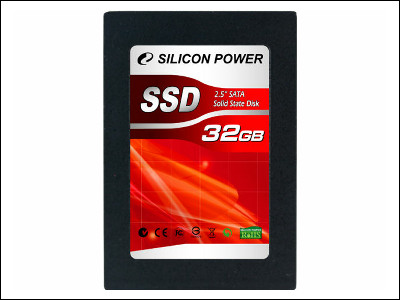"950 Pro" with the performance to overwhelm SATA with adoption of the new standard "NVMe" for SSD is thoroughly compared with the old model

New standard for storage "NVMe"Is a protocol developed for SSD, a memory-based storage, attracting attention as it can demonstrate performance that surpasses the conventional S-ATA standard. Samsung released NVMe compliant SSD "950 ProTechnology News SiteArs TechnicaIt is reviewing.
950 Pro review: Samsung's first PCIe M.2 NVMe SSD is an absolute monster | Ars Technica
http://arstechnica.com/gadgets/2015/10/950-pro-review-samsungs-first-pcie-m-2-nvme-ssd-is-an-absolute-monster/
◆ 950 Pro Overview
950 Pro is a high-end model of the preliminary released low-priced SSD "SM951". Three-dimensional three-dimensional structure in which cells developed by Samsung are vertically stackedV-NAND(Former name: 3D V-NAND) The second generation version of Flash realizes 128 Gbit capacity per chip by stacking 32 layers vertically.
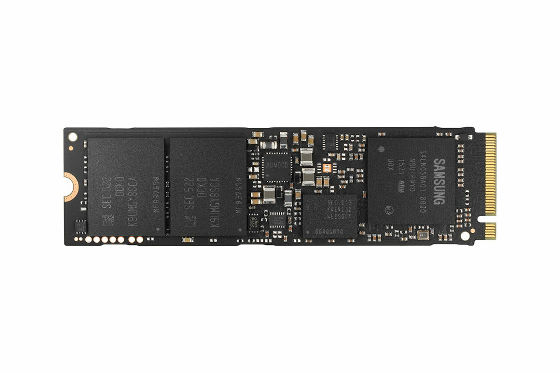
From the left, 3.5 inch HDD, 2.5 inch SSD, M.2 standard SSD (950 Pro). 950 Pro is an SSD of form factor M.2 with a total length of 80 mm. Currently, it is sized to fit in the M.2 slot which is generally adopted on the mainstream Intel 1XX series and 9X series motherboard reasonably.
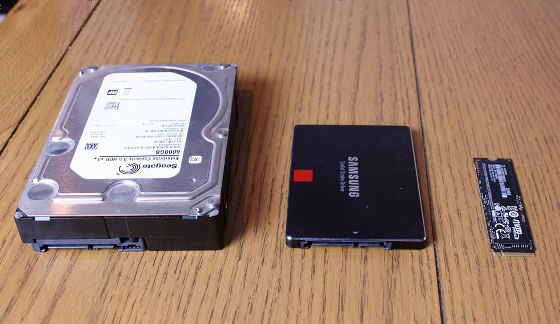
Unlike the already popular M.2 standard SSD, the 950 Pro employs X4 of PCI Express Gen 3 instead of SATA, and supports NVMe of the new protocol. In addition, the 950 Pro is expected to be released in 2016 with 2 model models of 256 GB and 512 GB at the time of release and 1 TB model will be released in 2016.
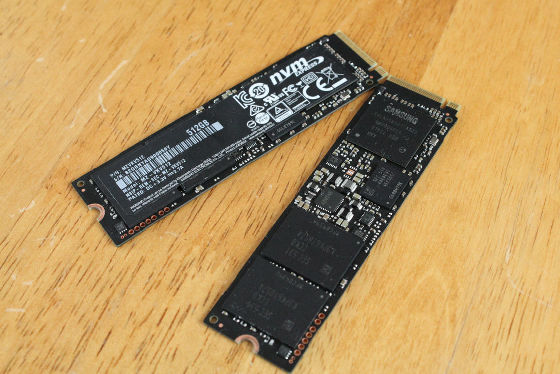
◆ Benchmark
Ars Technica has ASUS X99-A with PCI Express Gen 3 × 4 M.2 port on the motherboard, Intel Core i 7-5960 x CPU, DDR 4 (2666 MHz) memory of Corsair in memory as 32 GB, OS as NVMe standard It measures the performance of 950 Pro with the corresponding configuration of Windows 10 Pro (64 bit).
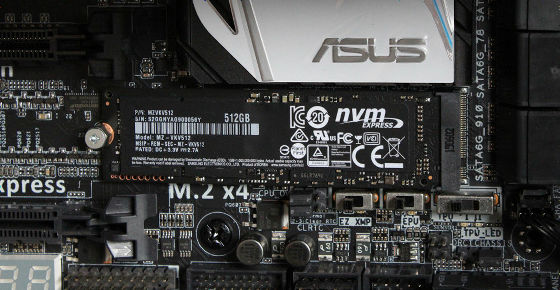
· Random performance
IometerMeasurement of random performance using old model, 2.5 inch SSD of SATA connection type in old model "850 ProCompared with this feeling like this. The 950 Pro compatible with the PCI Express Gen 3 × 4 for the 850 Pro that adopts the same V-NAND is equal to or slightly higher than the light, but it is a result of winning in the lead performance.

AS SSD BenchmarkBut this trend has not changed at all.

· Sequential performance
Even when sequential performance is compared with AS SSD Benchmark, the 950 Pro has recorded double score of about 2000 MB / s in the lead and 850 Pro in the light, lightly crossing the wall of SATA 3 (600 MB / s) in both read and write It is.

CrystalDiskMarkThe measurement result at 5.02 has become a performance that exceeds the official announcement of Samsung like this.

Individual scores of each SSD are as follows. This is 950 Pro (512 GB).

950 Pro (256 GB)

850 Pro (512 GB). It can be confirmed that the limit of 600 MB / s in SATA 3 is a complete bottleneck.

850 Pro (256 GB) also seems to be unable to demonstrate the performance of memory and controller.

· IOPS performance
With AS SSD BenchmarkIOPSIt is like this when measuring. This is a score of 850 Pro (512 GB).

850 Pro (256 GB)

950 Pro (512 GB)

950 Pro (256 GB). As you can see, the 950 Pro has overwhelmed the 850 Pro even with IOPS.

· Actual use simulation
However, it is possible to comprehensively evaluate the performance when actually using itPCMarkIn the benchmark measurement using 8, although it can be confirmed that there is a large difference in the transfer rate (green) of the raw data, it is a result that there is no big difference in actual use simulation (orange).

The startup time is the fastest 950 Pro (512 GB), but they are all close to each other. It seems not to be able to experience speed up.

Ars Technica, which has completed various benchmark measurements, said the 950 Pro realized overwhelming performance not found in other SSDs in terms of having high sequential performance and lead IOPS performance, while also offering low cost models compatible with NVMe SM951 It is a disadvantage that the price is higher than that of the 2.5 inch type SSD of a common SATA connection, it seems that it will be limited to a special environment such as extremely high IO load is required I have concluded.
Related Posts:
in Hardware, Posted by darkhorse_log





